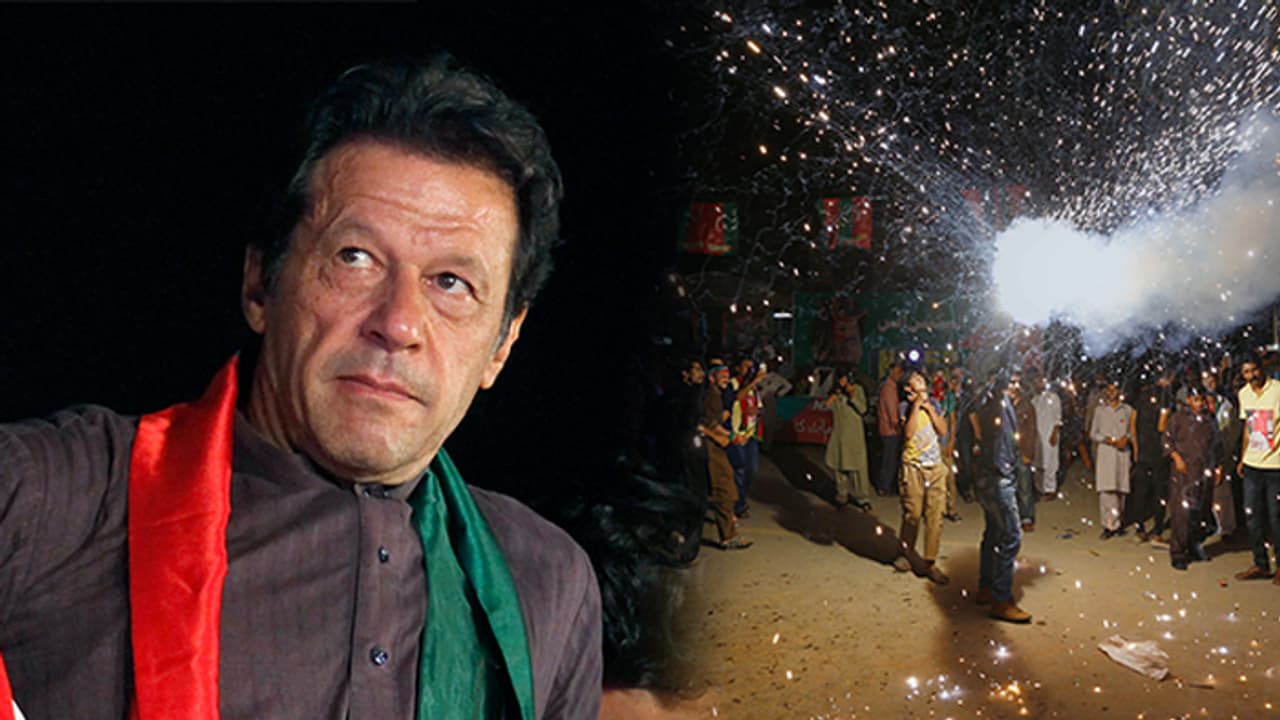Supporters of Imran Khan's Pakistan Tehreek-e-Insaf celebrate unofficial results announced by television channels; PML-N president Shahbaz Sharif has outrightly rejected the election results, alleging "blatant" rigging
Pakistan's flamboyant cricketer-turned-politician Imran Khan's Pakistan Tehreek-e-Insaf was leading on 110 seats, while its main rival Pakistan Muslim League-Nawaz was way behind with 67 seats as trends indicated a possible hung parliament.
The election was marred by a deadly suicide attack and allegations of manipulation by the powerful military, with several parties raising objections over the entire process.
The Pakistan Peoples Party (PPP) of former president Asif Ali Zardari was leading on 41 seats, indicating he could be the kingmaker in case of a hung parliament.
According to the latest trends available for 268 of the National Assembly's 272 seats, independents were leading on 18 seats. Polling was postponed on two constituencies following the deaths of candidates in terror attacks.
PML-N president Shahbaz Sharif has outrightly rejected the election results, alleging "blatant" rigging.
Sharif hinted his party would launch protests against the alleged rigging of polls.
"Some five other parties including PPP have raised the rigging issue in polls. After consulting them, I will announce the future course of action. Pakistan has suffered today," he told journalists at a press conference.
"We will fight this injustice and use all options." Sharif termed it the dirtiest election in Pakistan's history. "This is a horrible situation which I have never seen in my 30-year political career. These were the dirtiest polls in Pakistan's history," he said.
PML-N spokesperson Marriyum Aurangzeb raised objections over the counting process and alleged that her party's agents were forced out from several polling stations.
"The counting process is being carried out behind closed doors and changes are being made to Form-45," she told reporters.
According to Election Commision of Pakistan website, the first Form 45 is the Result of the Count' showing the number of valid votes for each contesting candidate and ballot papers excluded from the count
PPP's Maula Bux Chandio also claimed that his party's agents were not allowed inside polling stations in Badin while Pak Sarzameen Party leader Raza Haroon made the same claim about the treatment meted out to their agents at different polling stations across Karachi.
Responding to the allegations, the provincial election commissioner in Punjab said political leaders should refrain from levelling baseless allegations without substantial proof.
Pakistan's National Assembly comprises a total of 342 members, of which 272 are directly elected whereas the rest - 60 seats reserved for women and 10 for religious minorities - are selected later through proportional representation among parties with more than five per cent of the vote.
A party can only form the government if it manages to clinch 172 seats in total. A single party will need at least 137 of the directly elected seats to be able to form the government on its own.
According to the Election Commission, 3,459 candidates are in the race for 272 general seats of the National Assembly, while 8,396 candidates are running for 577 general seats of the four provincial assemblies - Punjab, Sindh, Balochistan and Khyber-Pakhtunkhwa. More than 30 political parties have fielded their candidates.
Earlier, the voting ended at its scheduled time despite calls by several major parties, including PML-N, PPP and PTI, to extend the polling time by an hour. They had complained of "a slow voting process" and thus sought more time to facilitate voters - a request the Election Commission rejected.
Hours after polling began for the general elections yesterday, an Islamic State bomber blew himself up outside a polling station in Bhosa Mandi area of Balochistan's provincial capital Quetta, killing 31 people, including policemen. Four persons were killed in poll-related violence.
Clashes erupted between rival parties outside several polling stations, reports said.
Nearly 10.6 crore people are registered to vote for members of the lower house of parliament and four provincial assemblies. The election marks the second democratic transition of power in the nation's 70-year history.
For a smooth polling process, the ECP had deployed around 1.6 million staff at polling stations across the country. About 4,49,465 policemen and over 3,70,000 military personnel were deployed for security. A public holiday was declared across the country today in order to facilitate the voting process.
The run-up to the elections had seen a massive crackdown on the media and allegations that the military has secretly backed the campaign of Khan while targeting his political opponents.
The military has ruled Pakistan through various coups for nearly half of the country's history since independence in 1947.
The ECP was also criticised for deploying the Army both inside and outside of polling stations.
Former prime minister Sharif, the supremo of the PML-N who was jailed this month after being convicted in a corruption case, also accused the military of pressuring the judiciary to convict him. Both institutions deny the charge.
Controversy has also arisen over allowing militant groups to participate in the election. The leading among them are Mumbai-terror attack mastermind Hafiz Saeed-led banned Jamat-ud Dawa's candidates.
